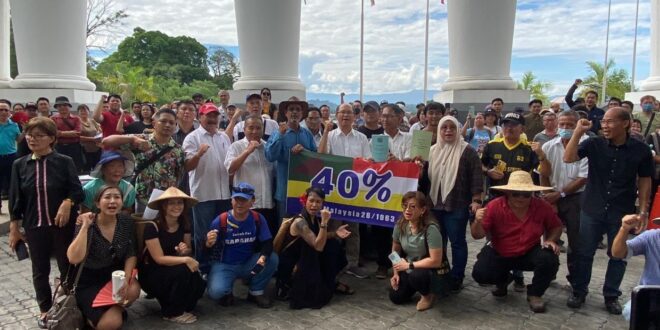KOTA KINABALU: The Sabah government sprang a surprise when it decided to intervene in the Attorney General’s appeal against a High Court decision to grant the Sabah Law Society (SLS) leave to challenge the 40% special constitutional grant provisions.
SLS opposed the state government’s intervention but the Attorney-General, represented by a four-man team led by senior federal counsels Shamsul Bolhassan and Ahmad Hanir Hambaly, had no objections.
The three-member Court of Appeal panel then granted the state government’s application to be an intervener and co-appellant against the leave granted to SLS by the Kota Kinabalu High Court.
The state felt that the rights of the Sabah government would be negatively affected if it was excluded from the hearing.
Justices Datuk Ravinthran N. Paramaguru, Datuk Mohd Nazlan Mohd Ghazali and Datuk Dr Choo Kah Sing allowed the state’s application at the hearing of the appeal at the Kota Kinabalu Court Complex yesterday.
Tengku Datuk Fuad Ahmed, who represented the state, later told reporters that if the Sabah government did not intervene, there was a risk that its right to challenge the Federal Government with respect to the 40% Special Grant provisions could be extinguished without being heard.
He said the review of the Special Grant under Article 112D(4) was “mandatory but not absolute”.
The Federal Government must grant a review whenever and as required by the Sabah government, he added. Tengku Fuad said that if the Federal Government breaches any of its constitutional obligations to Sabah under either Articles 112C or 112D (the 40% Special Grant Provisions), then the Sabah government can seek redress through the courts (the provisions being “justiciable”).
He said there was supposed to have been a mandatory review in 1974 but it was not done. The consequences of that breach are justiciable and for the court to decide on.
However, there is no specific constitutional provision to deal with the “Lost Years” between 1974 and 2021 that have lapsed, said Tengku Fuad.
“This is not a mandatory or absolute right. The 40% special grant revenue is an aspirational article. It is designed for something to work towards as opposed to absolute or right under mandamus,” he added, challenging the locus standi of SLS.
Under the Constitution there is a revenue-sharing formula by which the state would receive 40% of revenue above a certain threshold. Since 1974, the Federal Government has instead provided increased special interim grants to Sabah and Sarawak, with no review.
Earlier, SLS, led by Jeyan Marimuthu and Dr David Fung, had objected to the state government’s intervention, saying the government should not have the right to be heard since the appeal only concerns leave granted by the High Court to SLS.
Fung rebutted Tengku Fuad’s contention on SLS’ position, saying the Sabah government had had no issue with locus standi when leave was applied in the High Court.
On the Attorney General’s challenge to SLS’ standing, he said the AG had confused the threshold of locus standi.
“It is in the court’s discretion to grant the prayers. As for thresholds, public interest litigation has two criteria. Firstly, is there a public wrong? Secondly, is there a public duty?
“The duty here is Article 112C, which is public at the highest level (i.e.) federal to the state government. If there is a breach of duty, it is for the court to decide,” Fung said.
The federal Attorney-General argued that the 40% Special Grant provisions under Article 112c and 112D cannot be challenged in court because they concern financial and political considerations that are non-justiciable.
The Court of Appeal set May 24 for case management after hearing all parties’ arguments.
The case revolves around Kota Kinabalu High Court’s decision to grant SLS the right to proceed with a judicial review against both the Federal and Sabah governments, seeking to compel the return of 40% of federal revenue earned from Sabah.
 BeritaKini.biz Berita Viral Terkini di Malaysia
BeritaKini.biz Berita Viral Terkini di Malaysia





